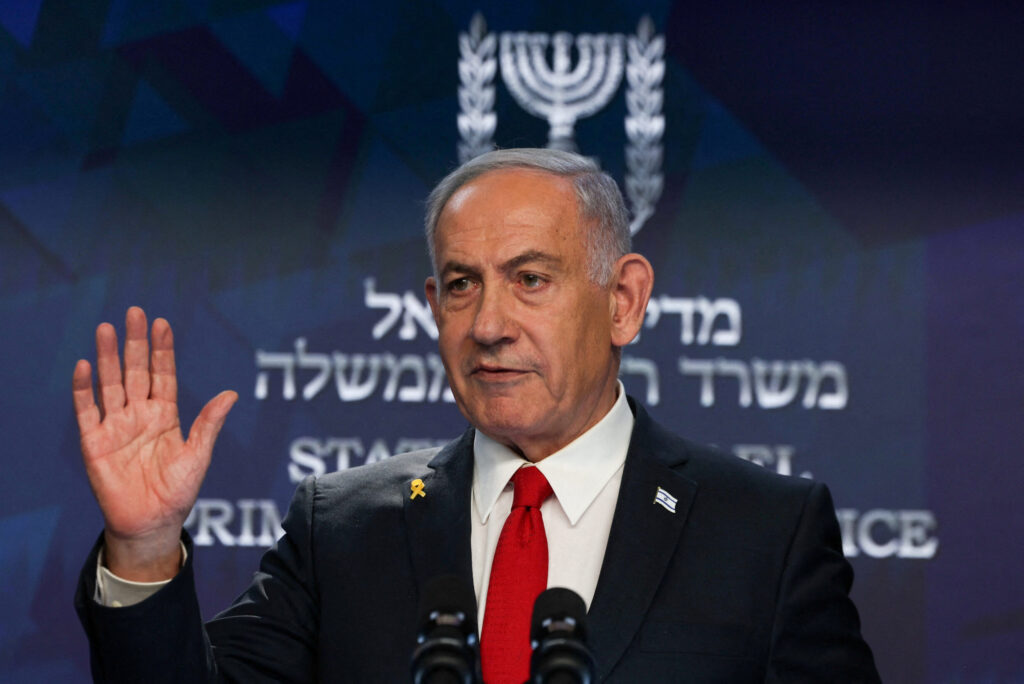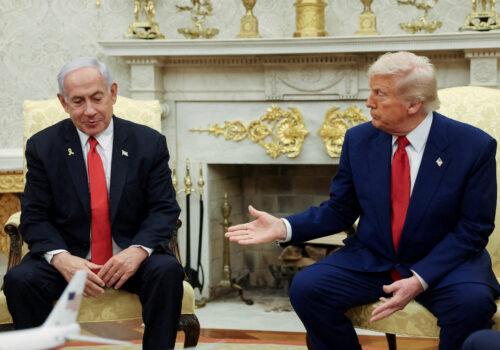Can the ultimate political survivor stay afloat? At home, Israeli Prime Minister Benjamin Netanyahu faces the challenge of keeping a fragile coalition together amid growing societal divisions over the war in Gaza and reemerging political fault lines that had receded following October 7, 2023. Abroad, the Netanyahu government confronts escalating international criticism for its conduct of the war in Gaza and recent public disagreements with Washington over Middle East policy. Meanwhile, Israeli media reported Thursday that Netanyahu is willing to accept the latest US cease-fire offer.
To illuminate what this all means, we reached out to Shalom Lipner, a former adviser to seven consecutive Israeli prime ministers, including Netanyahu, to get a sense of how the Israeli political landscape has shifted after more than six hundred days of war.
1. What is the state of play in Israeli politics right now?
The Israeli public square is a bubbling cauldron, with multiple challenges—foreign and domestic—negatively impacting the prospects of Netanyahu’s majority. His government has demonstrated remarkable resilience over these past twenty months of multifront warfare, rebounding relatively quickly after October 7, 2023, to put Israel’s enemies (including Hamas in Gaza and Hezbollah in Lebanon) on the defensive. However, the pressing need to make strategic decisions is exposing fissures that now threaten the stability of Netanyahu’s governing coalition.
Netanyahu’s next moves on Gaza and Iran—two theaters of operation where he appears increasingly misaligned with the Trump administration—could exacerbate those pressures, compelling him to choose between the support of the United States and that of his key coalition partners. More immediately, a potential revolt within the ranks of his government, whose ultra-Orthodox members have issued an ultimatum that they will bolt unless their demands for a military draft exemption are met next week, could create a cascade that triggers early elections. Adding to this volatility, Netanyahu’s cross-examination by the prosecution in his corruption trials will begin next week.
2. How do current divisions compare with pre-October 7 divisions in Israeli politics?
The horrors of October 7 had a chilling effect on the Israeli population, instantly sidelining the disputes—most prominent among them, issues relating to plans for an overhaul of the judiciary—that had paralyzed the country, with precedence shifting to the critical functions of national defense and rehabilitation. Israelis mobilized to meet those tasks, with civil society often filling vacuums in service left by a crippled bureaucracy.
With the passage of time, however, as many crises have since been downgraded or become routine, a “new normal” has created space for pre-October 7 divisions to resurge with a vengeance. This has been most evident in the resumption of divisive government initiatives to circumscribe the mandate of the courts and to assert absolute control over senior appointments. After more than eighteen months of combat, many in Israel believe that when Israelis do ultimately return to the polls, a fault line will be apparent. On one side will be those who have contributed tangibly to the war effort, with many spending hundreds of days on Israel Defense Force reserve duty. On the other side will be those who have evaded such responsibilities.
3. What does this mean for Netanyahu’s government?
In this state of affairs, an embattled Netanyahu is maneuvering to keep his coalition afloat, requiring him to keep its various components satisfied—notwithstanding assessments that most of them have no viable alternative to his leadership. To that end, the prime minister has rejected all solutions for Gaza that would enable Hamas to remain in the territory and, in the interim, to have a hand in administering the distribution of humanitarian aid. Netanyahu’s support for a lenient conscription bill fits into this category as well.
The success of his juggling act is far from guaranteed, however. His government has faced growing pushback from the international community—including, but not limited to, arrest warrants by the International Criminal Court; consideration of targeted sanctions by the United Kingdom, France, and Canada; and a review of the European Union’s association agreement with Israel. This has compounded the stakes of his gambit, possibly exacting an untenable cost for Israel that could encourage a shift in course.
4. What does this mean for US-Israel relations?
Mounting criticism from many of Israel’s traditional friends has only heightened its reliance on Washington. Not only does the United States continue to provide the overwhelming bulk of diplomatic and military assistance afforded to Israel, but Trump administration officials are also playing the lead role in ongoing mediation with Israel’s adversaries. Reportedly, however, Netanyahu has been flustered by a series of events that suggest that Trump’s objectives could actually imperil Israel’s situation.
Emerging details of negotiations that Steve Witkoff, the Trump’s Middle East envoy, has been conducting with Hamas and Iran have been a cause of concern in Jerusalem. Similar consternation was manifest when an end to US hostilities with the Houthis exempted Israel, and when the United States extended its embrace to the new Syrian regime. Netanyahu has repeatedly dispatched messengers to present Israel’s case before administration principals, but the differences between their approaches are unmistakable and could spark a wider breach in the bilateral relationship at an extremely precarious juncture.
5. How might this impact what comes next in the war?
The United States holds most of the cards in this scenario, as well as the agency to deploy them. If Witkoff produces a deal with Hamas that meets Trump’s minimum expectations, Netanyahu will have little choice but to overcome his reservations and accept its terms—and hope that he can persuade enough of his coalition to do likewise. The other, more dangerous option would be to risk running afoul of the White House and being subjected to a similar Oval Office reception as the presidents of Ukraine and South Africa, something which would broadcast Israel’s new vulnerability to the world.
Netanyahu is walking on even more fragile eggshells regarding Iran. Trump has stated that it “would be inappropriate” for Israel to attack Iran “right now because we’re very close to a solution.” The possibility of just such a strike—especially if Israel were to determine that Iran’s path to a nuclear weapon was imminent and unimpeded—cannot be ruled out unequivocally. In that event, however, and in its aftermath, a rupture with Trump could have disastrous consequences for Israel.
Shalom Lipner is a nonresident senior fellow for Middle East Programs at the Atlantic Council. From 1990 to 2016, he served seven consecutive premiers at the Prime Minister’s Office in Jerusalem.
Further reading
Tue, May 27, 2025
Jordan-Israel security cooperation continues quietly but unabated
MENASource By Emily Milliken
Despite diplomatic setbacks from the Israel-Gaza war, military and intelligence cooperation continues to thrive between the two neighbors.
Mon, May 12, 2025
Gazans fear famine amid Israel aid block: ‘I don’t want to be a number’
MENASource By Arwa Damon
For Palestinians, time is running out— a warning that has been echoed at some of the highest ranks of international organizations, including the World Health Organization.
Mon, May 19, 2025
Could Trump be ‘mediator-in-chief’ for Turkey and Israel in Syria?
MENASource By
If Trump wants to achieve the Middle East's “deal of a century," its important that Netanyahu and Erdogan resolve their differences in Syria.
Image: Israeli Prime Minister Benjamin Netanyahu speaks during a press conference, in Jerusalem, May 21, 2025. REUTERS/Ronen Zvulun/Pool



